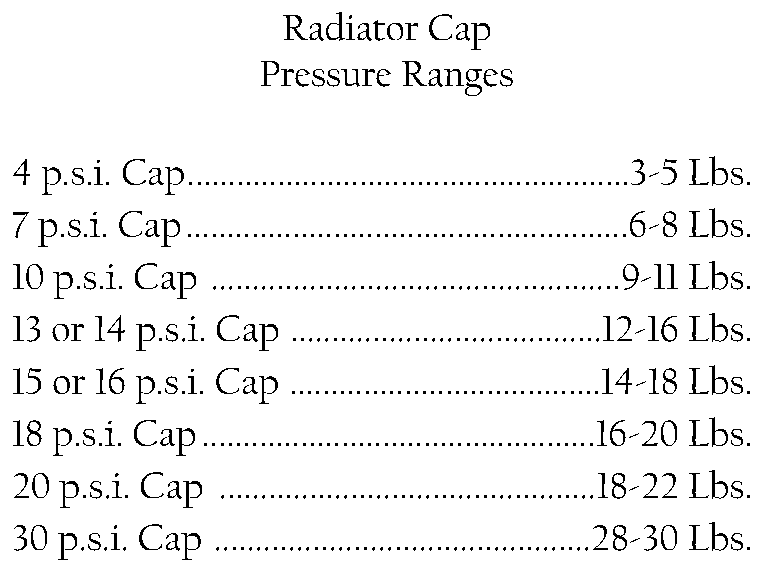Chevrolet Cobalt Service & Repair Manual: Cooling System Pressure, Test
| Caution: To avoid danger of
being burned, do not remove radiator cap while engine and radiator are still
hot, as fluid and steam can be blown out under pressure. |
| If radiator cap has contamination,
rinse it with water. |
| Before using a radiator pressure
tester, wet relief valve and pressure valve with engine coolant or water. |
| When performing pressure tests,
keep tester at an angle of over 30° above horizontal. |
| Refer to published specifications
to determine proper cooling system operating pressures. |
| 2. |
Attach cap to radiator pressure tester. |
| 3. |
Slowly pump tester and verify that
air is coming from vacuum valve. Push pump at constant speed. |
| 4. |
Pump tester quickly, about a one second
push, and measure relief valve opening pressure. Compare opening
pressure to pressure listed on cap. Refer to Fig. 1
for cooling system pressure range chart. |
| 5. |
Remove pressure tester from cap. |
| 6. |
Fill radiator and overflow to proper
level with coolant. |
| 7. |
Inspect overflow tube and overflow
bottle for dents, kinks, or internal obstructions. |
| 8. |
Wipe out inside of filler neck. Inspect
lower inside sealing seat of filler neck for nicks, dirt and solder
bumps. |
| 9. |
Inspect cams on outside of filler neck.
If cams are bent down or up, seating of pressure cap valve and tester
seal will be affected. If cams are damaged, have filler neck replaced
by a reputable radiator repair service facility. |
| 10. |
Attach a radiator pressure tester and
rotate tester head until locking ears contact stops on radiator. |
| 11. |
Operate pump until indicator on gauge
reaches just beyond color band for recommended pressure for vehicle,
Fig. 1. |
| 12. |
Verify that pressure does not drop.
If pressure drops, inspect hoses, radiator or water pump for leaks.
If no external leaks are found and pressure drops, inspect heater
core, cylinder block and head. |
| 13. |
Remove tester and install radiator
cap. |
|

Fig. 1 Cooling system pressure chart
A visual inspection must always
be performed to confirm the presence of aftermarket components, potential
collision damage, or areas of concern.
Always clean all external c ...
1.
Drain engine coolant into suitable
container.
2.
Reposition coolant expansion tank inlet
hose clamp using hose clamp pliers tool ...
See also:
Chevrolet Cobalt Owners Manual. Manual Seats
WARNING:
You can lose control of the vehicle if you try to
adjust a manual driver's seat while the vehicle is
moving. The sudden movement could startle and
confuse you, or make you push a pedal when you
do not want to. Adjust the driver's seat only when
the vehicle is not moving.
If the veh ...
Chevrolet Cobalt Owners Manual
Chevrolet Cobalt Service Manual

 Cooling System Leak, Inspection
Cooling System Leak, Inspection Engine Coolant Expansion Tank, Replace
Engine Coolant Expansion Tank, Replace